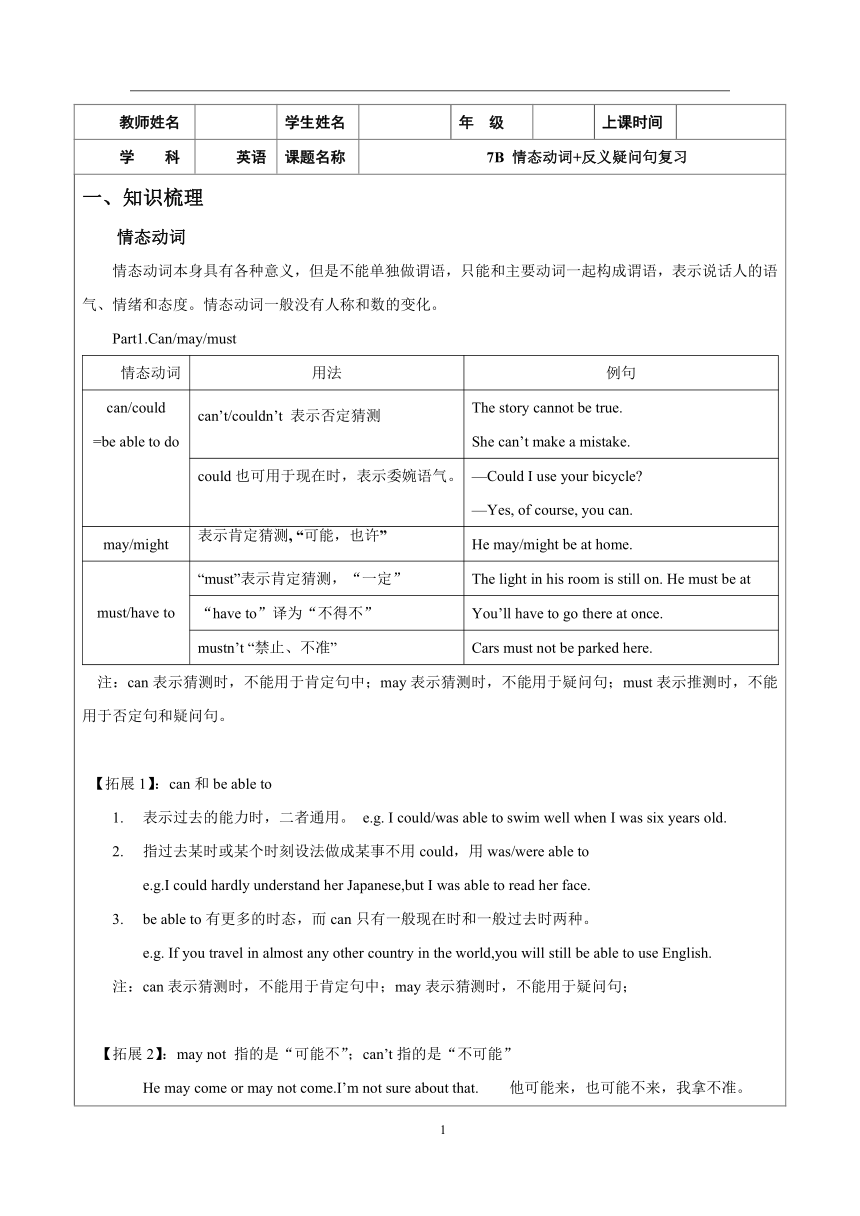
教师姓名 学生姓名 年 级 上课时间 学 科 英语 课题名称 7B 情态动词+反义疑问句复习 一、知识梳理情态动词情态动词本身具有各种意义,但是不能单独做谓语,只能和主要动词一起构成谓语,表示说话人的语气、情绪和态度。情态动词一般没有人称和数的变化。Part1.Can/may/must情态动词用法例句can/could=be able to docan’t/couldn’t 表示否定猜测 The story cannot be true.She can’t make a mistake.could也可用于现在时,表示委婉语气。—Could I use your bicycle —Yes, of course, you can.may/might表示肯定猜测, “可能,也许”He may/might be at home.must/have to“must”表示肯定猜测,“一定”The light in his room is still on. He must be at“have to”译为“不得不”You’ll have to go there at once.mustn’t “禁止、不准”Cars must not be parked here. 注:can表示猜测时,不能用于肯定句中;may表示猜测时,不能用于疑问句;must表示推测时,不能用于否定句和疑问句。 【拓展1】:can和be able to表示过去的能力时,二者通用。 e.g. I could/was able to swim well when I was six years old.指过去某时或某个时刻设法做成某事不用could,用was/were able to e.g.I could hardly understand her Japanese,but I was able to read her face.be able to有更多的时态,而can只有一般现在时和一般过去时两种。 e.g. If you travel in almost any other country in the world,you will still be able to use English.注:can表示猜测时,不能用于肯定句中;may表示猜测时,不能用于疑问句;【拓展2】:may not 指的是“可能不”;can’t指的是“不可能” He may come or may not come.I’m not sure about that. 他可能来,也可能不来,我拿不准。 He can’t believe your so-called excuses. 他不可能相信你那所谓的理由。 Part2. need作为情态动词:对疑问句的肯定回答用must,否定用needn't。 need do sth ., needn’t ———Need I tell him everything that has happend to his parents ———Yes,you must./No, you needn’t.作为实义动词:有人称和数的变化,后面要跟名词,代词,不定式to do等,其否定句、疑问句式痛普通动词没有任何变化。 need sth/need to do sth, 其对疑问句的用 doesn't need to I need to go to Beijing this Sunday to attend a book fair. 这个星期天我需要去北京参加一个书展。 ———Do I need to leave my telephone number and address ———我有必要留下电话号码和地址吗? ———Yes,you need./No,you don’t need to. ———是的,你需要。/不,你不需要。All living things need water. 所有的生物都需要水。He needs to get some sleep. 他需要睡一会。【拓展3】:must可以表示必须,此时可用于否定句和疑问句,多指现在或将来的情况,指说话人的主管语气。其否定形式mustn't表示一定不要/绝对不可以. I must go now,or I’ll be late./You must be here by ten o’clock. must更强调说话者的主观意愿;have to 强调客观上的必要性,常翻译为不得不。 I have to be off.My mom is expecting me./ You don’t have to get up early.Part 3. should / used 情态动词用法例句Will/Would“Will/Would like to do…”;“Will/Would you please do…”"Will you pass me the sauce, please I said I would support them. ( = I said, “I will support theShould表示“不可推卸的义务或责任”Every student should obey the school rules.He ought not (oughtn’t) to drink too much.表示劝告或建议时, ≈had betterWe ought to start at once. =We had better sta ... ...
~~ 您好,已阅读到文档的结尾了 ~~